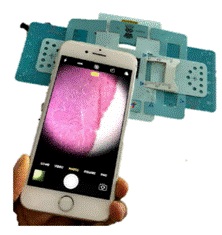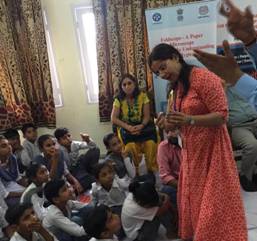Ministry of Science & Technology
Foldscope could be a better alternative to clinical microscope
प्रविष्टि तिथि:
22 JUN 2020 6:27PM by PIB Delhi
Foldscope is an affordable origami-based microscopy device composed of a series of paper clippings. Upon assembly, the device can hold a specimen slide for observation, and this specimen can be viewed via a mobile phone camera attached to it. Dr. Alka Rao‘s group at the Institute of Microbial Technology (IMTECH), Chandigarh, in collaboration with a team of doctors from a government hospital in Panchkula, Haryana, a private hospital in the National Capital Region (NCR), and a medical college from Imphal, have explored and validated the clinical utility of Foldscope in the diagnosis of diseases using various patient samples.
The study evaluated the use of the Foldscope in the clinical diagnosis of oral and urinary tract infections and evaluated its efficacy as a motivational tool for improving oral health among school children in India.

Smart phone mounted foldscope
The study identifies that Foldscope is particularly convenient to diagnose urinary tract infection (UTI) and monitor kidney stone. Using this tool, one can easily monitor own-kidney stone status at home with a simple glass-slide, a Foldscope and a phone in hand. Such monitoring could perhaps avoid kidney stone reaching a painful state or surgery in recurring cases.
“Given the ease of operation and low cost, Foldscope may be employed in public healthcare centres for primary diagnosis of oral health and UTI or as personal health monitoring device,” said Dr Alka Rao, Principal Scientist, IMTECH, while speaking with India Science Wire.

Dr Alka Rao during a workshop with children
To do the assessment, a patient sample like urine is smeared on a transparent glass slide and visualized under a Foldscope mounted on a cell phone. Sample images can be enlarged using the zoom function of the mobile, which can be stored on mobile memory card for later reference/patient records. Foldscope can be assembled using paper clips and mounted on cell phone using coupler and glue drops.
The researchers qualitatively compared the Foldscope to a clinical microscope by examining five different types of clinical samples. Of the different types of clinical samples, the Foldscope was effective in detecting infection in dental plaque samples and urine samples. The team further analysed 31 dental plaque samples of patients aged 3–13 years and 25 urine samples of patients aged 11–62 years.
“We also evaluated the use of Foldscope as an educational tool for motivating oral hygiene among 80 school children aged 12 years and found that students in the Foldscope intervention group had better measures of oral hygiene than did students in the non-intervention group,” said Dr Rao.
Based on the study findings, Foldscope appeared to be capable of visualizing calcium oxalate crystals, which are a major cause of kidney stones. “This tool can thus be applied successfully in regions where people are more prone to kidney stones due to environmental factors such as water quality,” said Dr Rao. Taken together, the study data suggest that the Foldscope can be used as an in-house diagnostic tool and personal health monitoring tool on a routine basis due to its affordability and zero maintenance cost. The study findings have been published in the Journal of Microscopy.
*****
NB/KGS/(India Science Wire)
(रिलीज़ आईडी: 1633378)
आगंतुक पटल : 1640